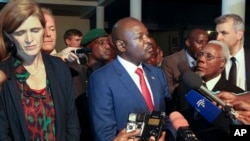Allegations that Rwanda has been recruiting and training Burundian rebels on its territory with the goal of ousting Burundian President Pierre Nkurunziza resurfaced Thursday in a confidential U.N. report.
A group of experts monitoring U.N. sanctions implementation in the Democratic Republic of Congo said it had interviewed 18 Burundian fighters in DRC’s South Kivu Province.
They all told the experts that “they had been recruited in the Mahama Refugee Camp in eastern Rwanda in May and June 2015,” and were given two months of military training by instructors who “included Rwandan military personnel,” according to the U.N. experts. Their findings were first reported by Reuters.
Allegations
The report, seen by VOA, quoted the fighters as saying they trained at a camp in the Rwandan forest and were instructed on the use of “grenades, anti-personnel and anti-tank mines, mortars and rocket propelled grenades.” They said they were transported around Rwanda in the back of military trucks, often with Rwandan military escort.
They told the monitors that “at least four companies of 100 recruits each” were being trained at the camp when they were there.
Six of the 18 fighters were minors – or child soldiers under international definitions. They said the instructors were aware of their youth.
The fighters told the monitors that they “crossed the Rusizi River in small groups at night from Rwanda into the DRC,” carrying fake Congolese identification cards.
The monitors said the fighters told them “their ultimate goal was to remove Burundian President Pierre Nkurunziza from power.”
Burundi has been mired in a sometimes violent political crisis since April of last year, when Nkurunziza sought and won what is widely seen as an unconstitutional third term.
Observers fear the violence – which has killed at least 439 people and caused 230,000 more to flee the country – could tip into another civil war or worse, in the ethnically mixed Hutu-Tutsi nation.
Arms Smuggling
The U.N. experts also reported Congo’s arrest of six individuals in October and November of last year on suspicion of arms smuggling in Goma, North Kivu Province. “The perpetrators are Rwandan or Congolese nationals and were caught at the Congolese-Rwandan border post with the weapons,” the report says.
Burundi’s president has accused Rwanda of interfering in his country. Late last month, he told a visiting U.N. Security Council delegation that “the threat is not from within Burundi — it comes from outside. The Rwandan government must be told to stop.”
The Rwandan government has dismissed the U.N. panel’s findings as “unfounded.”
Rwanda’s Ambassador to Brussels Olivier Nduhungirehe, who is vocal on social media, tweeted: “Mass graves, sexual terrorism, torture, extrajudicial killings, hate speech; and @BurundiGov wants to convince us that it's #Rwanda’s fault!”
At the Security Council Thursday morning, Russia’s Deputy Envoy Petr Iliichev told reporters the allegations are “troubling” and the council would have to look at the report. Asked if there should be a message sent to Rwanda, he said there is a framework agreement in which the countries agreed not to interfere in each other’s internal affairs and support negative elements.
“You signed, you agreed, you pledged, and now you have to fulfill your pledges,” he said.
UN Panel: Burundian Rebels Trained by Rwanda

UNITED NATIONS —










